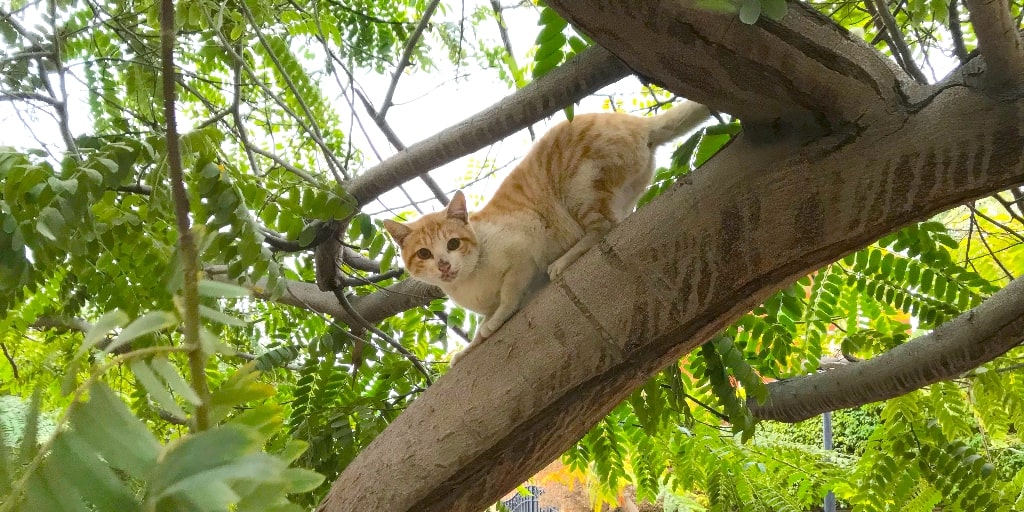I take care of stray cats in my garden. Last week, I lost two of them.
When strays wander into my garden, I give them food and water, play with them and pet them, and sometimes even let them inside the house if they’re well-mannered. We also neuter and spay the ones we can catch, so they won’t endlessly have babies and overpopulate the compound.
I’ve been caring for cats like this for 10 years. About five generations have lived their lives in my garden, alongside some others that have passed through.
Animal activist Randa Nabrawy strongly encourages this kind of care. “Where there is overpopulation, there are all sorts of problems,” she cautions.
However, “[spayed and neutered cats] return and protect their territory without letting other cats in, and they don’t multiply,” according to Nabrawy.
Since they’re essentially street cats, I know and accept that they won’t live the longest lives. I just try to make the time they have the most comfortable it can be.
What I can’t accept is when people cause these animals’ lives to be cut short.
Unfortunately, Torta, a stray tortoiseshell cat I was taking care of, and one of her kittens, were poisoned last week inside my garden.
It hurts to think that this was done to them in a place that should have been safe. It hurts even more to think that anyone could believe this is an acceptable action. Strays are living beings, too, and they do so much good for people and the environment in terms of hunting pests and discouraging them from returning.
“[Stray cats] are part of our existence, we shouldn’t hurt them,” Nabrawy insists.
Sadly, this is not always the case. Why, then, do strays continue to get poisoned?
Living Among Stray Animals
Nabrawy points out that people often forget we live in the desert. We developed this place amidst animals that always existed here.
“The city is full of strays. You can’t tell them to stop at the entrance of a compound — it is an extension of the city,” stresses Nabrawy.
Mass poisonings of these animals are an unfortunate occurrence in Egypt, especially in social clubs and compounds. They are carried out to remove cats and dogs from these areas, but they are an entirely ineffective solution.
She explains that the sudden removal of a population creates a vacuum that is then filled by other strays in the surrounding areas looking for a different territory. With the original population gone, they move in unhindered.
“Imagine there’s an empty apartment,” Nabrawy suggests. “If there are people there and I try to get in, they’re not going to let me. But if it’s empty, I’ll just enter.”
This is precisely what happens in compounds too — every time one of my cats (especially the more aggressive ones) leaves, others come to claim the garden in their place.
“The problem is that there are people who want there to be a void of everything but humans. It’s insane,” Nabrawy says incredulously. “[Some people will say] remove the cats, remove the dogs, remove the birds, remove the trees, remove the mosquitos — mafeesh haga esmaha keda (no such thing can be done).”
The fact of the matter is that we live in an ecosystem and both stray dogs and cats are a part of it. They serve purposes that people disregard when trying to get rid of them.
“[Dogs are] the first line of defense against foxes and animals that live in the desert. […] They’re territorial, so they don’t let anything else in,” Nabrawy explains. Dogs are also fierce protectors as well as loyal companions, as any owner would know.
In a slightly different way, cats are as well. As predators of rats and other rodents, they naturally provide pest control in populated areas like cities and compounds. Moreover, if you can get them to warm up to you, they’ll also be your kindest fluffy friends.
“[They are not only] pest control, they are creatures — makhlookat rabena (God’s creations),” she says. All animals, including strays, have the right to be treated with kindness, not cruelty.
“Many animals need help,” the activist comments, recalling her rescuing work. “[Volunteering] opened my eyes to their plight, and how irresponsible people are towards them in the streets.”
Nabrawy also encourages caution when coming up to them, warning that every animal reacts differently to being approached. Most of the time, they’re hungry and scared.
In her view, the most effective solution regarding the country’s strays would be to get the government to sponsor Trap, Neuter, Release (TNR) programs in which strays are captured, neutered or spayed, then safely returned to where they were caught, so they are not displaced.
There is also value in raising awareness about these mistreated animals because the key to helping the strays is to humanize them in the eyes of people who see them as pests. It’s the only hope to ensure that cats like Torta — and other stray animals and pets across the country — don’t meet her same fate.
The opinions and ideas expressed in this article are the author’s and do not necessarily reflect the views of Egyptian Streets’ editorial team. To submit an opinion article, please email [email protected].
Subscribe to the Egyptian Streets’ weekly newsletter! Catch up on the latest news, arts & culture headlines, exclusive features and more stories that matter, delivered straight to your inbox by clicking here.






Comments (4)
[…] Source link […]
[…] Source link […]